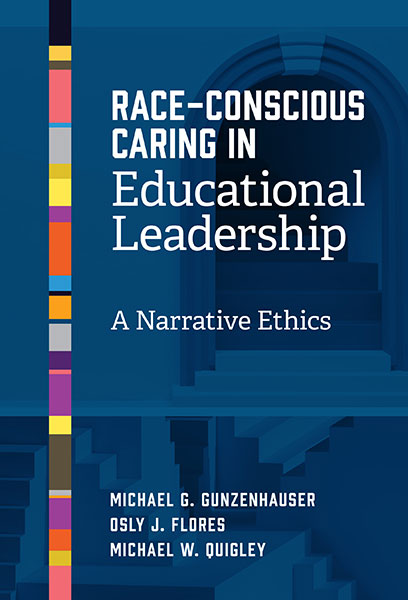Professors: Request an Exam Copy
Print copies available for US orders only. For orders outside the US, see our international distributors.
Michael G. Gunzenhauser, Osly J. Flores, Michael W. Quigley
Publication Date: September 26, 2025
Pages: 224

This book describes a model for educational leadership ethics that provides a critical, reflective vision of what education can be for all children in K–12 schools.
The authors of Race-Conscious Caring in Educational Leadership conducted interviews with 22 school leaders who shared their visions toward serving students of color. The resulting model is built around the four features demonstrated by the strongest leaders: race consciousness, critical caring, justice leadership, and ethical praxis .
Race-conscious caring leaders go beyond their good intentions to develop deep understanding of the needs and interests of their students, they learn about racial identities and histories as strengths and sources of learning, and they provide opportunities for educational experiences that are routinely denied to marginalized and minoritized students.
This book provides numerous examples of race-conscious caring leaders, with key analysis of where leaders fall short. It is designed to help future and current leaders to critically reflect on their own experiences, challenging them to build their capacity for transformative change.
Book Features:
Michael G. Gunzenhauser is a professor in the Department of Educational Foundations, Organizations, and Policy and senior associate dean in the School of Education at the University of Pittsburgh. Osly J. Flores is an assistant professor in the Department of Education Policy, Organization and Leadership at the University of Illinois at Urbana-Champaign. Michael W. Quigley is an associate professor at Robert Morris University with joint appointments in the Department of Education and the Department of Communication and Organizational Leadership.
“Race-Conscious Caring in Educational Leadership powerfully weaves together race consciousness, critical caring, justice leadership, and ethical praxis to reimagine what it means to lead with integrity in education and beyond. Grounded in the lived experiences of practicing school leaders and relevant research on race-conscious leadership, it offers a visionary roadmap for transformative leadership and social change.”
—Sonya Douglass, professor, Teachers College, Columbia University
“Can a ‘narrative ethics,’ one that takes race-consciousness and critical caring as points of entry, guide educational leadership today when diversity, equity, and inclusion initiatives are under scrutiny? Based on their interviews with 22 school leaders, Gunzenhauser, Flores, and Quigley think so—and I agree with them. In a contested political environment, starting with the narrated experience of others enables the communication, compassion, and critical reflection that democracy and education both require.”
—Barbara S. Stengel, professor emerita, Peabody College at Vanderbilt University
“Race-Conscious Caring in Educational Leadership is a timely contribution to the field at a time when ‘race-consciousness’ is being leached from the field. It courageously moves beyond generic notions of ‘equity’ by insisting that educational leaders engage deeply with the realities of race, power, and systemic injustice. Through a critical lens, the authors illuminate how caring is not a neutral act, but one that must be grounded in racial consciousness to be truly just and effective. This book is not just a call to action—it is a framework for reimagining leadership in ways that center the humanity, dignity, and brilliance of students and communities. For leaders who are committed to meaningful change and courageous practice, this text is essential reading.”
—Noelle W. Arnold, senior asssociate dean and professor, educational administration, Department of Educational Studies, The Ohio State University
“This essential empirical work by Gunzenhauser, Flores, and Quigley highlights the need for student-centered caring, and illuminates how students should be cared for in ways they can understand and appreciate. The school leaders in this book demonstrate that we must understand the cultures of our students in order to provide care in ways that speak to students' hearts and their core identities.”
—Lisa Bass, associate professor, North Carolina State University
Professors: Request an Exam Copy
Print copies available for US orders only. For orders outside the US, see our international distributors.